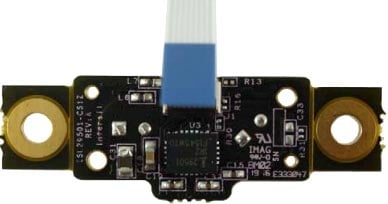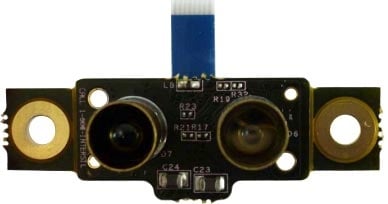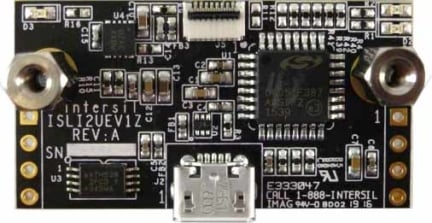Overview
Description
The ISL29501-CS-EVKIT1Z is a distance measurement reference design consisting of an optical board and a controller board. It combines the ISL29501 Time of Flight (ToF) based signal processing chip with an OSRAM SFH 4550 IR emitting LED and OSRAM SFH 213FA photo-diode. The two circuit boards are connected together with a flat flex cable. Included is a USB flash drive containing the evaluation software for a PC and related technical documents.
The ISL29501-CS-EVKIT1Z kit also allows quick evaluation of the ISL29501 performance for a 5m sensing system.
Features
- Self contained measurement system
- Enables proximity detection and distance measurement
- Emitter DAC with programmable current up to 255mA
- Operates in continuous or single shot mode
- On-chip active ambient light rejection
- Regulated power 2.7V to 3.3V USB or external supply
- I2C interface supporting 1.8V and 3.3V bus
- Small size 38mm x 20mm
Applications
- Mobile consumer applications
- Industrial proximity sensing
- Power management
- Home automation
Documentation
|
|
|
|
|---|---|---|
| Type | Title | Date |
| Manual - Development Tools | PDF 1.31 MB | |
| End Of Life Notice | PDF 597 KB | |
| Manual - Development Tools | PDF 1.31 MB | |
| Datasheet | PDF 1001 KB | |
4 items
|
||
Design & Development
Product Options
Applied Filters:
Videos & Training
Learn how to perform a calibration of the ISL29501-ST-EV1Z Sand Tiger reference design kit.
Transcript
ISL29501-ST-EV1Z Sand Tiger Software Setup
Okay, so today we're going to show you the ISL29501 demo. We have our device plugged into USB. We're going to launch the GUI by double-clicking the icon. Our software agreement comes up. You have to scroll to the bottom, hit Accept, and the GUI will open up.
Load Profile
The first thing you need to do is load a profile. To do this, you go File, Load Profile, you select the PFL file you wish to load, hit Open, and what this does is it sets some register values within the device.
Calibration
Next step is calibration. Click Calibration, and there's three different parts. There's Magnitude, Cross Talk and Distance.
Magnitude is simple. Click Magnitude, Calibrate. When it turns green, you hit Done.
Cross Talk, it's going to prompt you to place a black piece of foam covering the emitter and receiver. Once you've done that, hit Calibrate. When it turns green, hit Done.
The third part is Distance. To do this you need to have an object at a known distance. Right now, we have a white cardboard box at 30cm, so you punch in 30cm, hit Calibrate. When the values are filled in and the box turns green, hit Done, then Accept to store these, and our calibration is finished.



